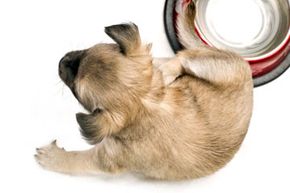A nasty little parasite lies in wait for your dog just outside your door: the flea. It just takes a few fleas to begin a vicious cycle of infestation. These tiny creatures with six legs and no wings can leap tall dogs in a single bound. Scientists have identified nearly 2,000 species of fleas, but ironically, it's Ctenocephalides felis -- the cat flea -- that gives dogs the most grief.
Fleas can be more than just irritating. Besides the usual itching and scratching, some dogs are extra-sensitive to flea saliva. One bite may be enough to bring on the unbearable itching of flea-allergy dermatitis (FAD). The raw skin is also more vulnerable to bacterial infections, and your dog may get hot spots -- areas of moist infection that spread and can be difficult to control. Puppies or dogs with compromised immune systems can become anemic or even die. Fleas are also carriers for intestinal parasites like tapeworms. If you do suspect that your dog has fleas, it's important to get rid of the infestation as soon as possible.
Advertisement
There are over-the-counter products available to treat your dog, but they're not as effective as the products prescribed by your veterinarian. Prescription medications are more expensive at first, but they're safer and work faster; some claim to rid your dog of fleas in less than a day. These products generally work to repel and kill adult fleas as well as flea eggs. Some also repel and kill other parasites like ticks and even prevent heartworm infestations. You could also try natural flea repellents, such as those made with cedar oil. Talk to your vet about which product is right for your dog.
No matter what you decide to use, be sure to follow the directions exactly. In this case, more isn't better. All flea-control products are poison and can harm your dog if not used properly. If your dog begins to drool heavily or shake after applying a flea control product, get him to the vet immediately. Also, you should never use flea-control products designed for dogs on cats, or vice versa. If you have other pets in the household, all of them must be treated for fleas at the same time using the appropriate medication.
Read on to find out why treating your dog is only the first step to getting rid of fleas.
Advertisement
